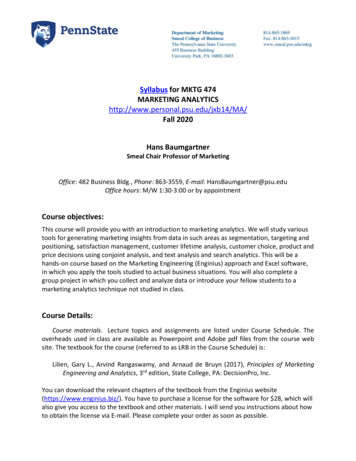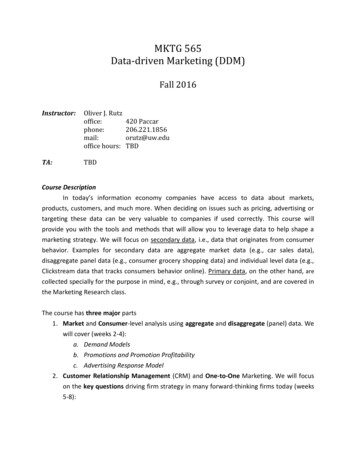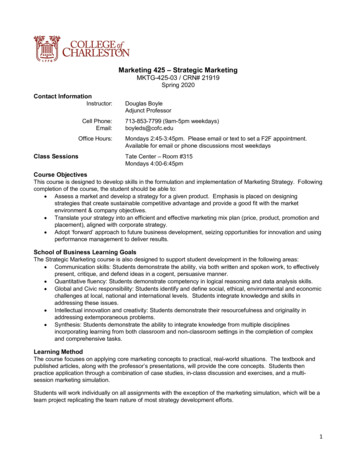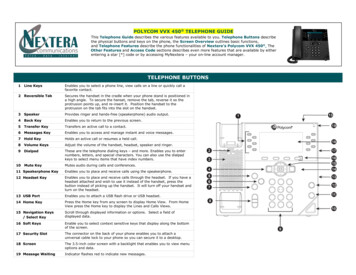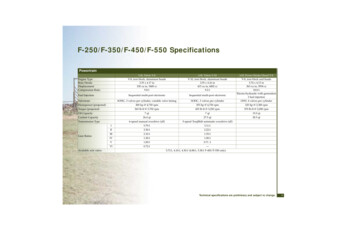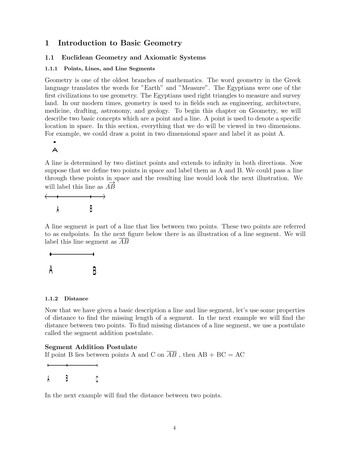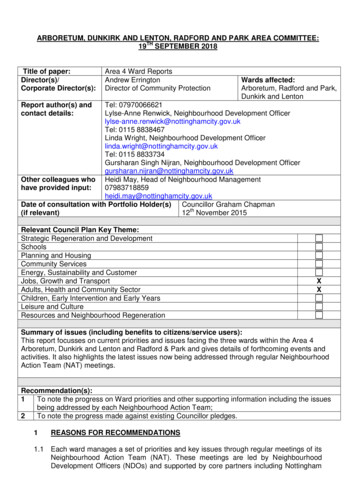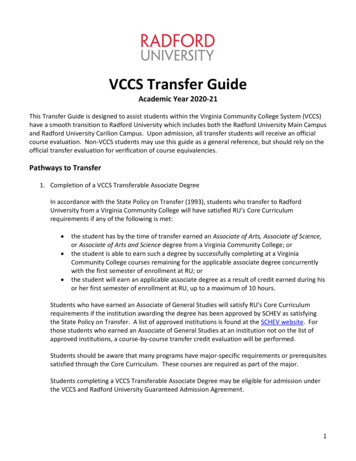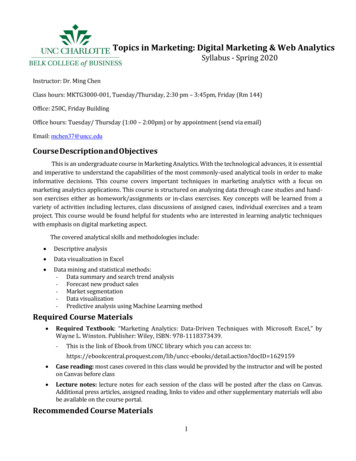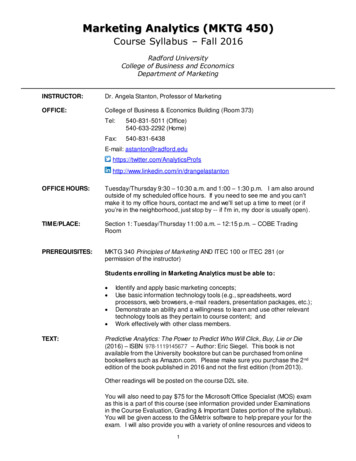
Transcription
Marketing Analytics (MKTG 450)Course Syllabus – Fall 2016Radford UniversityCollege of Business and EconomicsDepartment of MarketingINSTRUCTOR:Dr. Angela Stanton, Professor of MarketingOFFICE:College of Business & Economics Building (Room 373)Tel:540-831-5011 (Office)540-633-2292 (Home)Fax:540-831-6438E-mail: CE HOURS:Tuesday/Thursday 9:30 – 10:30 a.m. and 1:00 – 1:30 p.m. I am also aroundoutside of my scheduled office hours. If you need to see me and you can'tmake it to my office hours, contact me and we'll set up a time to meet (or ifyou’re in the neighborhood, just stop by -- if I'm in, my door is usually open).TIME/PLACE:Section 1: Tuesday/Thursday 11:00 a.m. – 12:15 p.m. – COBE TradingRoomPREREQUISITES:MKTG 340 Principles of Marketing AND ITEC 100 or ITEC 281 (orpermission of the instructor)Students enrolling in Marketing Analytics must be able to: TEXT:Identify and apply basic marketing concepts;Use basic information technology tools (e.g., spreadsheets, wordprocessors, web browsers, e-mail readers, presentation packages, etc.);Demonstrate an ability and a willingness to learn and use other relevanttechnology tools as they pertain to course content; andWork effectively with other class members.Predictive Analytics: The Power to Predict Who Will Click, Buy, Lie or Die(2016) – ISBN 978-1119145677 – Author: Eric Siegel. This book is notavailable from the University bookstore but can be purchased from onlinebooksellers such as Amazon.com. Please make sure you purchase the 2 ndedition of the book published in 2016 and not the first edition (from 2013).Other readings will be posted on the course D2L site.You will also need to pay 75 for the Microsoft Office Specialist (MOS) examas this is a part of this course (see information provided under Examinationsin the Course Evaluation, Grading & Important Dates portion of the syllabus).You will be given access to the GMetrix software to help prepare your for theexam. I will also provide you with a variety of online resources and videos to1
help prepare you for the exam. However, if you do not have a great deal ofexperience with Excel or want more training, you may want considerpurchasing an Excel book such as: Microsoft Excel 2016 Bible: TheComprehensive Tutorial Resource (2016) by John Walkenbach (ISBN: 9781119067511; Publisher: Wiley) -- this particular book is a verycomprehensive resource (and will cover far more than necessary to pass thespecialist exam). Please note, though, that you should not need additionaltexts to pass the certification exam.COMPUTER:You will need a computer that runs a recent version of the WindowsOperating System (Windows 7 or higher). You will also need to haveMicrosoft Office 2016 installed on your computer. These are nowrequirements for students in the Radford University BBA program and are arequirement for this course. The GMetrix training software that you will beable to use to help you prepare for the MOS certification exam only run s in aWindows environment as this is intended to simulate the types of questionspresented on the exam (which is also a Windows-based exam). Additionally,the Excel for Mac does not have the same functionality as Excel forWindows. If you have a Mac and you do not wish to set it up to runWindows, you will either have to (1) use computer labs on the RadfordUniversity campus (GMetrix is only available in the COBE Trading Room), (2)borrow a laptop that meets these requirements, or (3) purchase a laptop tomeet these requirements.FOUNDATIONS FOR THIS COURSEThis course supports the mission and vision of the College of Business and Economics at RadfordUniversity: Mission of the College of Business and Economics: The newly adopted mission of theCOBE is to provide an active learning environment that develops analytical and innovativebusiness professionals for the dynamic global economy Vision of the College of Business and Economics: The newly adopted vision states “We willbe recognized for challenging minds, cultivating talents, and connecting people in atechnology-rich learning environment.”WHY MARKETING ANALYTICS?Analytics is both an art and a science to discover and understand historical patterns in a company’sdata in order to predict and improve business performance under forecasted environmental,economic, and competitive conditions.Firms operate in an increasingly challenging business environment, with greater competition, moreinformed customers and rapidly changing market trends. Simultaneously, they also have access tomore information about their customers, the marketplace and their competitors than ever before.There has been an exponential growth in data generated from internal and external databases, storescanners, customer transactions, web navigation, online search, and more recently, social media butmost companies do not know how to best use this data. Thus, it is imperative that a ll marketingprofessionals understand the data available to them and how to most effectively make use of it. Inthis environment, knowing how to use this information to make optimal business decisions is acrucial competitive advantage and companies are, as a result, seeking trained professionals whohave the skills to analyze the data to help managers make better marketing decisions. But the realityis: the demand for individuals grounded in Analytics far exceeds the supply of graduates .Analytics is seeing demand outpacing the supply of talent! The U.S. Bureau of Labor Statisticspredicts that there will be a 24 percent increase in demand for professionals with managementanalysis skills over the next eight years; and McKinsey Global Institute Predicts there will be a2
shortage of talent necessary for organizations to take advantage of Big Data. By 2 018, the UnitedStates alone could face a shortage of 140,000 to 190,000 people with deep analytical skills as wellas 1.5 million managers and analysts with the know-how to use the analysis of big data to makeeffective decisions.Marketing analytics drives organizational insights; insights lead to greater understanding ofcustomers and markets; that understanding yields innovative products, better customer targeting,improved pricing, and superior growth in both revenue and profits. That’s why today’s co mpaniesare viewing analytics and employees who can create and use them as essential for creating value .COURSE DESCRIPTION AND OBJECTIVESMarketing Analytics tools and techniques are developed and applied to real-world businessdecisions. Major emphasis is placed on developing an understanding of the data available tomarketers, its uses and limitations, and the tools and techniques for predicting and measuring theeffectiveness of a company’s marketing efforts. Analytical, critical thinking and technolo gy skills willbe enhanced throughout the course.The course will be taught using a variety of materials and exercises including lectures for keyconcepts and processes, in class and out of class exercises, and applied projects to enhancestudent understanding and skill. Due to the technical and applied nature of the subject matter,hands-on experience with various analytical tools and software will be a key component of thecourse.This course will introduce students to state-of-the-art marketing analytics and will demonstrate howto practically apply these analytics to real-world business decisions. Students will develop anunderstanding of the data available to marketers, its uses and limitations, and be exposed tomethods for measuring performance of marketing efforts. Students will acquire hands-onexperience with tools and software which may include spreadsheet-based models, marketingmetrics, business intelligence and modeling software and web/social media measurement tools. In aworld where marketers are held accountable for results, the mastery of marketing analytics is anindispensable competitive advantage.This course also supports the needs and expectation of employers when hiring college graduates. 1Specifically this course will focus on the needs of employers in the following areas:Intellectual and practical skills, specificallyoooooooThe ability to communicate effectively, orally and in writingCritical thinking and analytical reasoning skillsThe ability to analyze and solve complex problemsTeamwork skills and the ability to collaborate with others in diverse group settingsThe ability to innovate and be creativeThe ability to locate, organize, and evaluate information from multiple sourcesThe ability to work with numbers and understand statisticsIn this course we will be operating as a partner with IBM through the IBM Academic Initiative. Assuch, you will have access to software and materials usually only available to members of industry.IBM SPSS Statistics, IBM SPSS Modeler and Microsoft Excel, along with discussions of webanalytics software will aid in student understanding of the complex and increasing demand forindividuals knowledgeable of and trained in Marketing Analytics. The course experience will be fastpaced and content-rich to reflect the dynamic nature of data analytics.1“Employers’ View s On College Learning In The Wake Of The Economic Dow nturn: A Survey Among Employers,” Conducted OnBehalf Of The Association Of American Colleges And Universities, Hart Research Associates, January 2011.3
At the conclusion of the semester, you will be able to: Describe the decision-making process and the role of marketing analytics as a decisionsupport tool in an organizationDemonstrate how to apply marketing analytics procedures to business problem solvingApply key marketing analytics tools and techniquesDifferentiate and employ the basic principles and methods of data mining and predictiveanalyticsSpecific outcomes include: Understand the decision making process and the role of Marketing Analytics as a decisionsupport tool in an organization; Understand the relationship between Marketing Analytics, CRM and customer loyalty; Understand how Marketing Analytics are applied in various industries and functions; Gain knowledge of the strengths and weaknesses of the various Marketing Analytics modelsand statistical applications available in the market; Understand the different types of data being used in Marketing Analytics and their nuances;Understand the information technology considerations inherent in Marketing Analytics toinclude database development/manipulation, data warehousing, and database querying; Gain hands-on experience in applying Marketing Analytics procedures to business problemsolving;Understand why market segmentation is so important and identify segments using RFM andCluster Analysis; Measure the value of segments using customer lifetime value modeling; Explore how to “slice and dice” the data to get different views of the in formation; how toaggregate and disaggregate the data to see the information with varying degrees ofresolution; and how to do important types of analytics and related reports;Acquire hands-on experience with key Marketing Analytics tools such as Microsoft Excel,IBM SPSS Statistics, and SAS Enterprise Guide;Be able to create reports using various visual displays including pivot tables; Be able to evaluate marketing problems and determine suitable analytical methods; Understand the difficulties presented by massive, opportunistic data;Understand the basic principles of data mining; the different methods of data mining; andhow they compare;Gain an understanding of the privacy, ethical, governmental, and legal issues in data miningand marketing analytics. THE VALUE OF THIS COURSECompanies are witnessing an exponential growth in customer data and find they are ill prepared toturn the data in to meaningful information for marketing management decision making. This datacomes from a variety of sources including email and other unstructured text; surveillance cameras;distribution and logistics; customer characteristics; marketing research; media usage; customerspending habits; competitive and business intelligence; POS scanners and market basket anal yses;internet marketing including web searches and navigation; and social media. With so much rawdata, organizations urgently need tools and employees who know how to use them to effectively andefficiently extract actionable information to help optimize business decisions. Analytics is both an artand a science to discover and understand historical patterns in a company’s data in order to predictand improve business performance under forecasted environmental, economic, and competitiveconditions. Analytics leads to a greater understanding of customers and markets which yieldsinnovative products and services, better customer targeting, improved pricing, and superior growth inrevenues, profits, and market share. Companies today are seeking graduates fu lly grounded in4
business principles, but who also possess the analytical skills to develop better decision models andcreate more accurate predictions of customers’ response to business decisions.COURSE EVALUATION, GRADING & IMPORTANT DATESYou will be evaluated on your knowledge of marketing analytics and your ability to apply thatknowledge effectively. Your performance will be evaluated by means of examinations, in and out ofclass assignments, quizzes and your level of engagement in the class (participation). Specifically,the weights assigned to each of these performance measures (as well as the associated dates) are: Exam 1 (12%) – Google Analytics Certification – since this a 90 minute exam, you willnot be able to take this exam during class. You will be able to choose the date and timeyou wish to take the exam but you must take the exam before the beginning of class onOctober 6, 2016. Exam 2 (12%) – this is a take home exam that is due no later than the beginning of classon November 1, 2016 Exam 3 (12%) – this is a take home exam that is due no later than 6 p.m. on Fr
Marketing Analytics (MKTG 450) Course Syllabus – Fall 2016 Radford University College of Business and Economics Department of Marketing INSTRUCTOR: Dr. Angela Stanton, Professor of Marketing OFFICE: College of Business & Economics Building (Room 373) Tel: 540-831-5011 (Office) 540-633-2292 (Home) Fax: 540-831-6438
